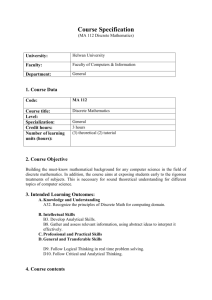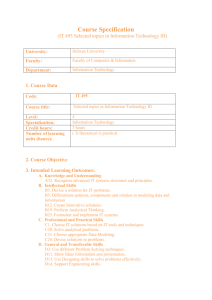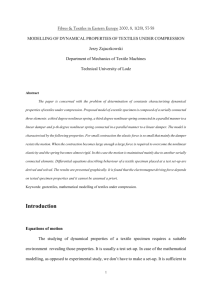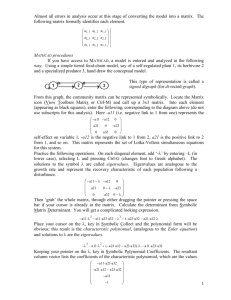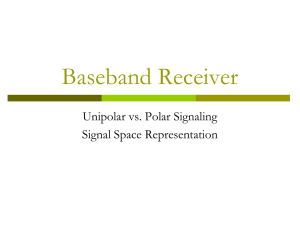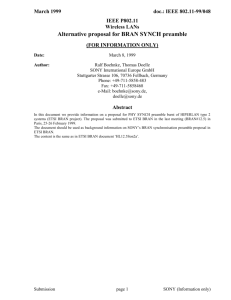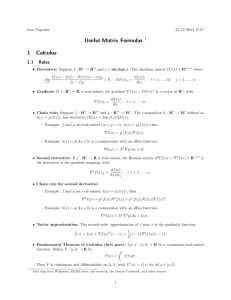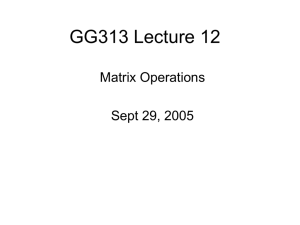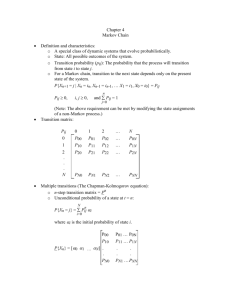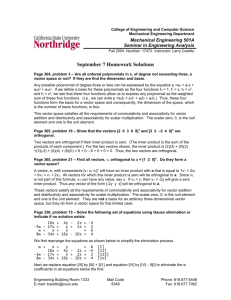interior revitalization (semester 08 — lecture)
advertisement
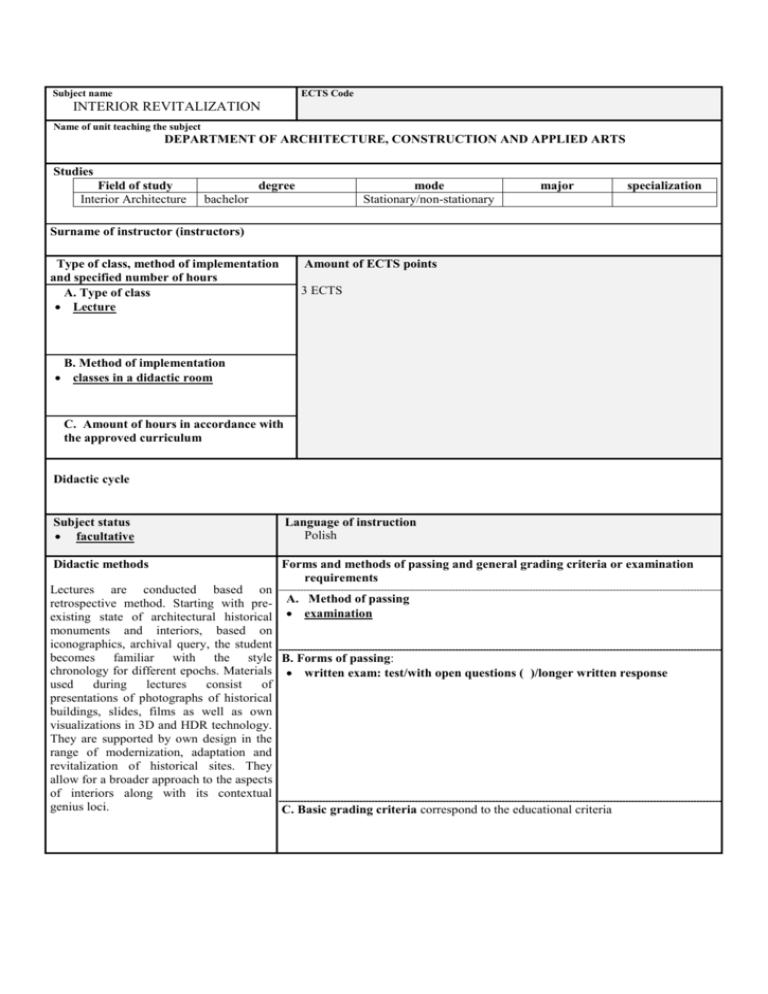
Subject name ECTS Code INTERIOR REVITALIZATION Name of unit teaching the subject DEPARTMENT OF ARCHITECTURE, CONSTRUCTION AND APPLIED ARTS Studies Field of study Interior Architecture degree mode Stationary/non-stationary bachelor major specialization Surname of instructor (instructors) Type of class, method of implementation and specified number of hours A. Type of class Lecture Amount of ECTS points 3 ECTS B. Method of implementation classes in a didactic room C. Amount of hours in accordance with the approved curriculum Didactic cycle Subject status facultative Language of instruction Polish Didactic methods Forms and methods of passing and general grading criteria or examination requirements Lectures are conducted based on retrospective method. Starting with pre- A. Method of passing existing state of architectural historical examination monuments and interiors, based on iconographics, archival query, the student becomes familiar with the style B. Forms of passing: chronology for different epochs. Materials written exam: test/with open questions ( )/longer written response used during lectures consist of presentations of photographs of historical buildings, slides, films as well as own visualizations in 3D and HDR technology. They are supported by own design in the range of modernization, adaptation and revitalization of historical sites. They allow for a broader approach to the aspects of interiors along with its contextual genius loci. C. Basic grading criteria correspond to the educational criteria Definition of preparatory subjects and initial requirements Must specify: A. Formal requirements: the basis of understanding the lecture cycle is art and architecture history B. Initial requirements: familiarity with principles of designing in historical context, drawing, 3D techniques. Subject aim Developing an approach method for the interior architect with complete creative awareness to the subject of arrangement, revitalization and recomposition of historical interiors taking into account norms and regulations of construction law, intellectual property and knowledge of historic eras. Program content Student should, while using previously acquired knowledge in the field of freehand drawing, descriptive geometry and architecture history, prepare notes in the form of drawings. As a basis of communications he should use a graphic „expression”, while using the newest technological achievements, i.e. new graphic techniques and interactive design possibilities. The newest 3D techniques allow for using them in design aspects of historical buildings and interiors. Literature A. Literature required to pass the class (pass the exam) A.1. used in class Broniewski. T. Historia architektury w zarysie Ossolineum 1959r. Bochnak .A .Historia Sztuki Nowożytnej T1 ,T2 PWN 1983r. Cole.E. Architektura i style w architekturze-Style i detale Arkady 2010r. Koch .W. Style w Architekturze GeoCenter 1996r. Neufert E. Podręcznik projektowania architektoniczno-architektonicznego Arkady 1980r. A.2. studied independently by the student Ulatowski K. Historia włoskiego renesansu PWN 1972r. Watkin D. Historia architektury zachodniej Arkady 2006r. Wilson A. Ogrody projekty ,realizacje Arkady 2004r. B. Supplementary literature Kuca K. Castel contry houses NHI Prague 2009r. Gossel. G. Architektura XX w. Taschen 1983r. Ridey K.. Ilustrowane Słowniki Architektura Arkady 1994r. Study effects: Due to the education process the student should be able to use basic terminology and techniques taught in his field of study. He should possess the ability to analyze phenomena and solve design problems in the scope of the knowledge imparted to him. The final effect should be a properly completed design, using norms, regulations and a knowledge compendium regarding the conservation of historic monuments in the context of their functioning and public reception. Effect no Description of effect Relation to major-related Relation to educational outcomes in the educational outcomes education area Knowledge: W1 W2 W3 W4 Possesses knowledge regarding art, graphic techniques. Independently solves design problems K_W08 A1P_W10, A1P_W13,A1P_W15 Possesses knowledge regarding contextual designing of historical quarters and interiors K_W07 A1P_W11,A1P_W12 Knows the basic rules of shaping space in historical interiors K_W07 A1P_W11,A1P_W12 Knows rules of theoretical knowledge and its practical application K_W11 A1P_W10 W5 Knows rules of designing details and furniture K_W16 A1P_W10, A1P_W13, A1_PW15 W6 Possesses knowledge about the newest techniques, axonometric projection to interior design W7 Possesses knowledge regarding legal issues and copyright law K_W13 A1P_W14 Possesses knowledge about subject-related literature K_W17 A1P_W11,A1P_W13, A1P_W14, A1P_W15 K_U08 A1P_U14, A1P_U15, A1P_U16, A1_U17, A1P_U19 K_U09 A1P_U14, A1P_U15, A1P_U20, A1_U21, A1P_U24 K_U13, K_U09 A1P_U14, A1P_U15, A1P_U20, A1_U21, A1P_U24 W8 Abilities: U1 Possesses the artistic ability to design historical interiors U2 Designs his own versions of interior solutions U3 Possesses the ability to present his design concepts, creatively expresses his visions and concepts U4 Can make photographs and do historical documentation using HDR technology U5 Can creatively use design techniques in the designing process U6 Possesses sufficient specialist vocabulary to freely communicate with specialists in the K_U12 field of art history and architecture U7 Can develop a concept and range of reserach works in historical interiors, testing for the presence of polychromy, nodes testing A1P_U14, A1P_U17, A1P_U28, K_U14 A1P_U22 Works together in a collective and in interdisciplinary teams K_K05 A1_K05 Is conscious of the undertaken design decisions K_K03 A1_K02, A1_K04 Strives to raise his professional qualifications K_K19 A1_K01, A1_K03 Does not violate copyright and intellectual property laws K_K01, K_K02 A1_K06 Follows the principle of primum non nocere K_K01, K_K02 with regards to historic monuments A1_K06 Social competencies: K1 K2 K3 K4 K5 K6 Humility in relation to the pre-existing historical urban fabric K_K21 A1_K01, A1_K03, A1_K04
